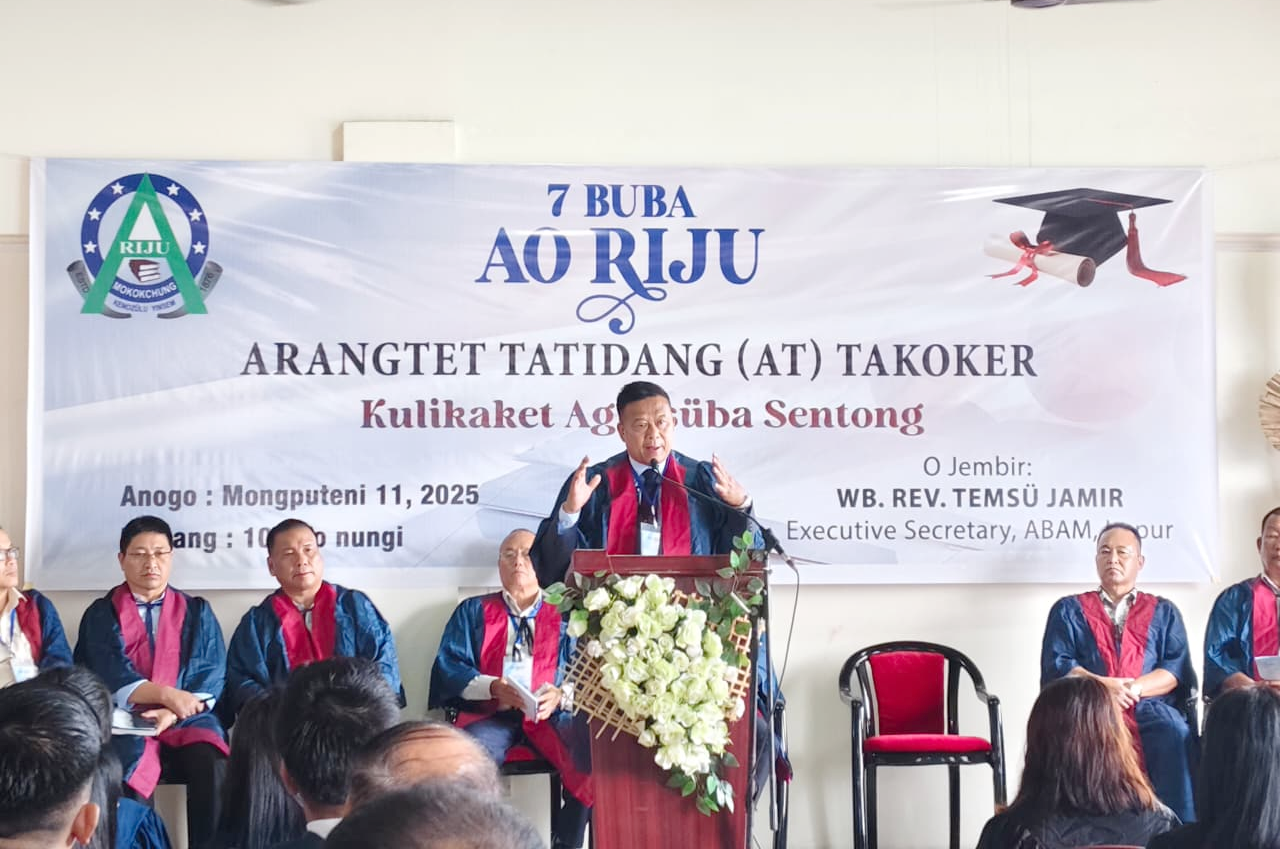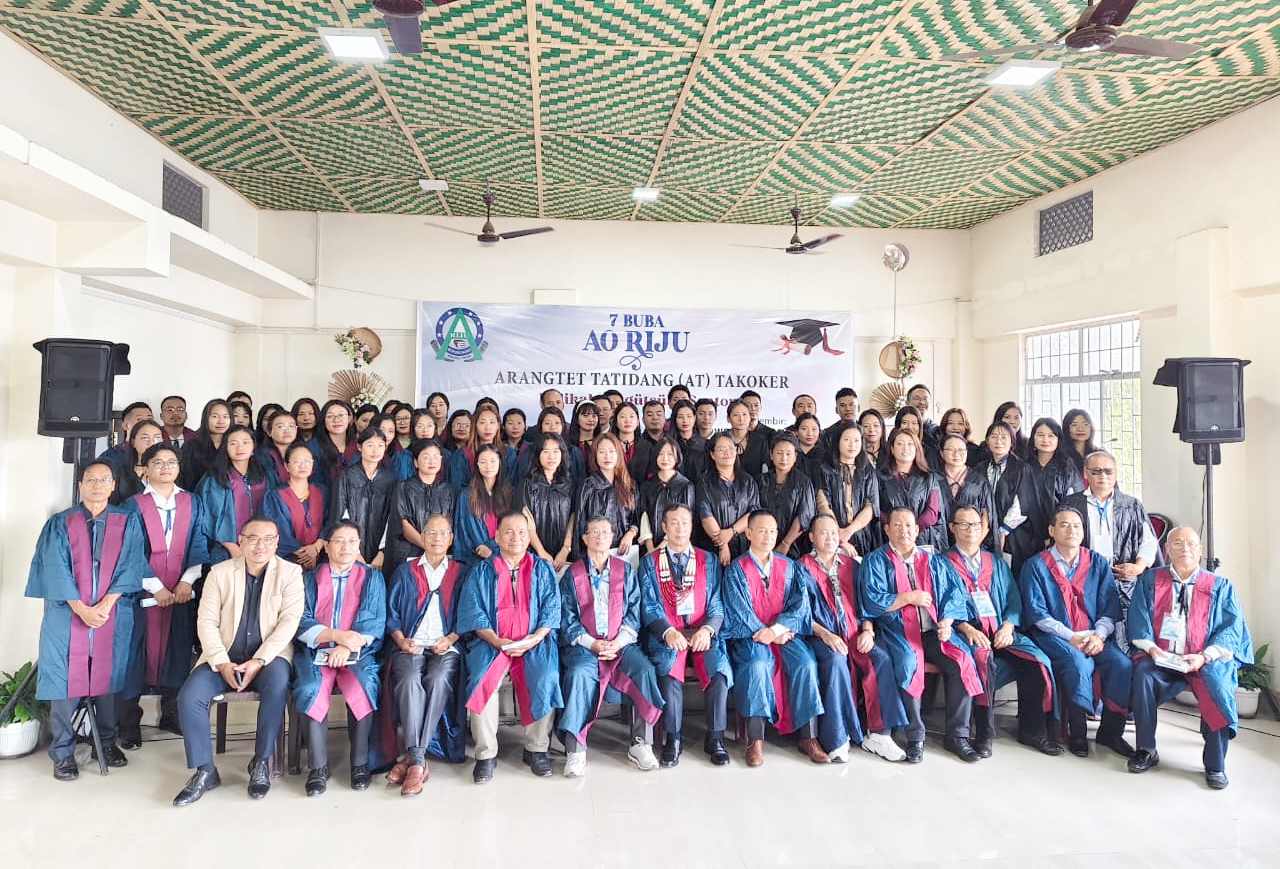The 7th Ao Riju (Ao Academy) ‘Arangtet’ (AT) Achievers Convocation Ceremony was held on October 11 at Aor Kilem (Conference Hall), Mokokchung, where a total of 104 students were conferred certificates by the Ao Riju (Ao Academy).
Speaking on the topic “Sobaliba Tamentakdakji Pei Oshi” (One’s language is the cornerstone of one’s cultural identity), Rev Temsü Jamir emphasized that language forms the very foundation of a community’s identity, wisdom, and worldview.
“A language is not only a means of communication but an identity of a community,” he said, adding that the accent and intonation of one’s speech often reveal one’s linguistic roots. He further explained that language embodies a community’s wisdom, history, and values stating it carry the spirit of our parents, forefathers, and ancestors, where our collective story lies.
Describing language as “a living story of a community,” he said that within it lies the essence of a people’s lifestyle, faith, work, and relationships. He cautioned that when a sentence of a language is translated to another, its deeper meanings are often lost, as certain expressions cannot be fully conveyed in another tongue.
Quoting linguists and anthropologists, Rev Jamir remarked that “language is the storehouse of culture,” stating it reflects both identity and evidence of cultural uniqueness. He observed that wherever languages differ, cultures also differ correspondingly.
He further stated that language not only defines individual identity but also develops love, unity, and togetherness within a community. Through language, the wisdom, proverbs, songs, and oral traditions of a people—their “living archives”—are passed down from one generation to another. Hence, if a language dies, those living archives die with it.
Rev Jamir added that language shapes social etiquette and cultural understanding, and contribution to literary development and the preservation of communal wisdom for future generations. The growth of a language, he said, directly supports the growth of a community.

Citing linguists, he mentioned that language is the expression of one’s deepest emotions and identity. He concluded by noting that those who use their language with high regard uplift their identity and standard. He referred to Joshua Fishman’s eight stages of language development, which explain how the vitality of a language reflects the strength of a community’s cultural identity.
He noted that almost all Ao churches publish various books in the Ao language, and several associations also contribute to this effort. Rev Jamir urged these bodies to engage the talents of Arangtet achievers in such publications, expressing hope that their involvement would help in the standardization and uniformity of the Ao language.
In his keynote address, Chief Information Commissioner (Rtd.), Nagaland, I Meyionen Jamir informed that the Arangtet (AT) examination is conducted under Ao Riju (Ao Academy) of Ao Senden, formerly known as Ao Senden Literature Board (ASLB), which was established in 2006. Until four years ago, the examination was conducted twice a year, but in 2023, after ASLB transitioned to Ao Riju, the plan was to conduct only one examination in 2025. However, considering the determination of students and learners to complete their degrees as early as possible, it was decided to hold the examination twice this year, following the traditional schedule.
He explained that the Arangtet examination comprises three courses: Arangtet Certificate Tenren (Arangtet Certificate course), Arangtet Diploma Tenren (Arangtet Diploma course), and Arangtet Post Graduate Diploma course. Noting that the number of ‘Certificate course’ takers had decreased in recent years, Ao Riju decided in 2024 that this course would continue only until 2027 (2 years), while the Diploma and Post Graduate Diploma courses would continue as usual.
He shared that until 2022, a total of 665 individuals had received certificates across all three courses, and with the current batch of 104 achievers, the total now stands at 769.
In a journey of 13 years to teach the Ao language, Ao Senden informed the government that only Arangtet-certified individuals would be eligible to be Ao language teachers.
Speaking to the achievers, he said that everyone who has received Arangtet certificates may not necessarily find government jobs. He stated, “If the New Education Policy 2020 (NEP 2020) is implemented in the state, when the three-language formula comes into effect, Ao language subjects will be introduced in both government and private schools, along with other mother tongue languages.” However, he questioned why the government has not implemented NEP 2020, citing the creation of language teacher posts as the main obstacle. He expressed hope for its implementation, as it is a national policy, and encouraged literature boards to exert pressure in this regard.
He shared that Ao Riju’s main concern is that most writers and authors in Ao literature today are elders who have not taken the Arangtet examination, and there are not many young writers. He said that although these elders possess wisdom and talent, the lack of spelling standardisation remains a challenge. He stated that unless uniformity in Ao language spelling is achieved, there will continue to be confusion, and it is the responsibility of Arangtet-certified individuals to work on this.
He encouraged the achievers to learn from the elders and produce various kinds of books. He also urged them to document knowledge from elders before it is lost. He cautioned against the random coining of Ao words without the mandate of Ao Riju. He clarified that both Chungli and Mongsen are Ao languages, and if both have deeper meanings for a word, they will be considered, but the final decision will rest with Ao Riju.
He further cautioned that if the Chungli-speaking and Mongsen-speaking communities give importance only to their own dialects, it would create division and harm the richness of the Ao language. He said that such competition among themselves could lead to the downfall of the Aos.
He informed that only those Ao literature books produced with the knowledge and approval of Ao Riju would be considered for inclusion in school and college syllabi as study materials. This, he said, is to promote ‘spelling standardisation’ in the Ao language. He dismissed any misunderstanding that Ao Riju is restricting others in developing Ao language or words, clarifying that the initiative is meant to bring uniformity and not to claim ownership over the language.
He emphasised that there is no personal or individual interest in these efforts, but that the work is for the overall upliftment and unity of the community. He also announced that the revised edition of the Ao Osep (Ao Language Dictionary) will be released soon, incorporating missing words and new additions. He welcomed any youth who wishes to develop new applications to help in language development but encouraged them to wait for the new edition of Ao Osep to be published first, after which collective efforts can continue.
Imtipokyim, General Secretary of Ao Senden, also addressed the gathering on behalf of Ao Senden, while Longrilemba from Ungma spoke on behalf of the Arangtet achievers. Rev. Prof. Rongsen Mendenbuba of Ao Riju presented the certificates. FAC Kaketshir, (Ao Honours) presented a special number while I Temjen Tzüdir, P/H & Co-ordinator, delivered the vote of thanks. The program was chaired by Repabenla, Assistant Professor, FAC, Mokokchung. S Daniel, Ao Pastor of Nagaland Christian Revival Church, Mokokchung, offered the invocation, and Rev Puryapang, Pastor of Yimyu Baptist Arogo, pronounced the benediction.


